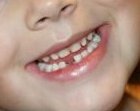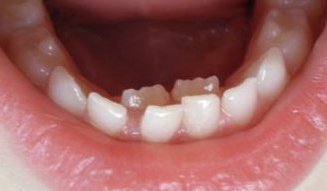
Problems with Baby Teeth Not Falling Out
Under normal conditions when a permanent tooth (except molars) is ready to erupt, the corresponding primary tooth must have already fallen out. In some cases the baby teeth do not fall out as expected. This could cause problems to the eruption of the permanent teeth, which usually need orthodontic treatment, or it may be a sign that there is a problem with the development of a permanent tooth.
Causes of Late Loss of Primary Teeth
Primary teeth are expected to exfoliate (fall out) between the ages of 6 to 12 years (for more details check this tooth loss chart). There are several conditions which may keep a baby tooth from falling out on time:
- If the jaw has not developed large enough, the growing permanent teeth inside it may become crowded and they may not be able to push out the baby teeth.
- In some rare cases the root of the baby tooth becomes fused with the jaw bone that surrounds it and it can’t be dissolved (ankylosis). The permanent tooth becomes impacted and it will fail to erupt unless the primary one that blocks its way is surgically removed.
- The permanent tooth may not have been yet developed fully, not being able to complete the resorption of the root of the baby tooth. Although usually it can cause just a simple delay, in some cases the adult tooth never develops properly and the baby tooth has to be retained.
- A permanent tooth may be completely missing due to a developmental anomaly, resulting in a retained baby tooth.
- The presence of supernumerary (extra) teeth may cause crowding and block the eruption path.
- Malnutrition and vitamin deficiencies are related with late loss of primary teeth.
- Delayed eruption of permanent teeth may be caused by several systemic conditions such as hypothyroidism and growth hormone deficiency.
If a problem is suspected, the dentist will take an x-ray to check the development and position of teeth in the jaw, in order to determine if a problem really exists or if the teeth are just developing bit slowly.
Problems caused by Losing Baby Teeth Too Late
The most common problem occurring when permanent teeth start to erupt before losing baby teeth is crooked or double row teeth. Both conditions may require extensive orthodontic treatment or the extraction of some of the permanent teeth.
Teeth in double row (also known as shark's teeth)

Sometimes a permanent tooth will erupt behind a baby tooth, forming a double row of teeth. It happens more often in the front teeth (incisors). The baby tooth will usually fall out within a week or two because of the pressure and the permanent one will move to its normal place without problems. Otherwise, the primary tooth has to be extracted by the dentist to prevent orthodontic anomalies. In any case, parents should consult a pediatric dentist or an orthodontist if such an incident occurs.
The delay of losing baby teeth may also have a negative effect on the child’s psychology. Getting their new adult teeth is considered as evidence of growing up. Being the only ones among their friends left still with their baby teeth can make children feel uncomfortable causing stress and inferiority feelings. The parents should explain that (same as the growth in height) each kid is different and that their own adult teeth will come later but they will be stronger than these of their friends. Children must be prevented from forcefully pulling out a delayed baby tooth. Actually, a theory suggests that as longer the permanent teeth remain in the jaw, they become stronger, harder, and more resistant to cavities.
When to worry about not losing baby teeth on time
Not all kids are losing their baby teeth at the same age. Some delays may be expected, especially if the primary teeth have erupted late. Normally, parents should get worried only if:
- a permanent tooth starts to erupt in an abnormal position,
- no tooth is lost by the age of 7,
- there is severe pain in the area of a healthy baby tooth in the time frame that it is expected to fall out, or
- after the eruption of the 12 year molars there is still another permanent tooth that has not erupted yet but the deciduous one is still in place.
- More articles about Baby Teeth

